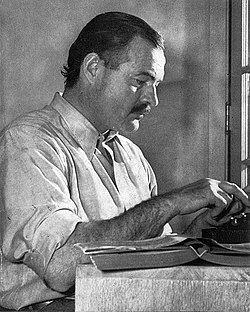Ernest Hemingway Quote
There was no wind, and, outside now of the warm air of the cave, heavy with smoke of both tobacco and charcoal, with the odor of cooked rice and meat, saffron, pimentos, and oil, the tarry, wine-spilled smell of the big skin hung beside the door, hung by the neck and all the four legs extended, wine drawn from a plug fitted in one leg, wine that spilled a little onto the earth of the floor, settling the dust smell; out now from the odors of different herbs whose names he did not know that hung in bunches from the ceiling, with long ropes of garlic, away now from the copper-penny, red wine and garlic, horse sweat and man sweat died in the clothing (acrid and gray the man sweat, sweet and sickly the dried brushed-off lather of horse sweat, of the men at the table, Robert Jordan breathed deeply of the clear night air of the mountains that smelled of the pines and of the dew on the grass in the meadow by the stream.
There was no wind, and, outside now of the warm air of the cave, heavy with smoke of both tobacco and charcoal, with the odor of cooked rice and meat, saffron, pimentos, and oil, the tarry, wine-spilled smell of the big skin hung beside the door, hung by the neck and all the four legs extended, wine drawn from a plug fitted in one leg, wine that spilled a little onto the earth of the floor, settling the dust smell; out now from the odors of different herbs whose names he did not know that hung in bunches from the ceiling, with long ropes of garlic, away now from the copper-penny, red wine and garlic, horse sweat and man sweat died in the clothing (acrid and gray the man sweat, sweet and sickly the dried brushed-off lather of horse sweat, of the men at the table, Robert Jordan breathed deeply of the clear night air of the mountains that smelled of the pines and of the dew on the grass in the meadow by the stream.
Related Quotes
About Ernest Hemingway
Hemingway was raised in Oak Park, Illinois, a suburb of Chicago. After high school, he spent six months as a reporter for The Kansas City Star before enlisting in the Red Cross. He served as an ambulance driver on the Italian Front in World War I and was seriously wounded by shrapnel in 1918. In 1921, Hemingway moved to Paris, where he worked as a foreign correspondent for the Toronto Star and was influenced by the modernist writers and artists of the "Lost Generation" expatriate community. His debut novel, The Sun Also Rises, was published in 1926. In 1928, Hemingway returned to the U.S., where he settled in Key West, Florida. His experiences during the war supplied material for his 1929 novel A Farewell to Arms.
In 1937, Hemingway went to Spain to cover the Spanish Civil War, which formed the basis for his 1940 novel For Whom the Bell Tolls, written in Havana, Cuba. During World War II, Hemingway was present with Allied troops as a journalist at the Normandy landings and the liberation of Paris. In 1952, his novel The Old Man and the Sea was published to considerable acclaim, and won the Pulitzer Prize for Fiction. On a 1954 trip to Africa, Hemingway was seriously injured in two successive plane crashes, leaving him in pain and ill health for much of the rest of his life. He committed suicide at his house in Ketchum, Idaho, in 1961.
